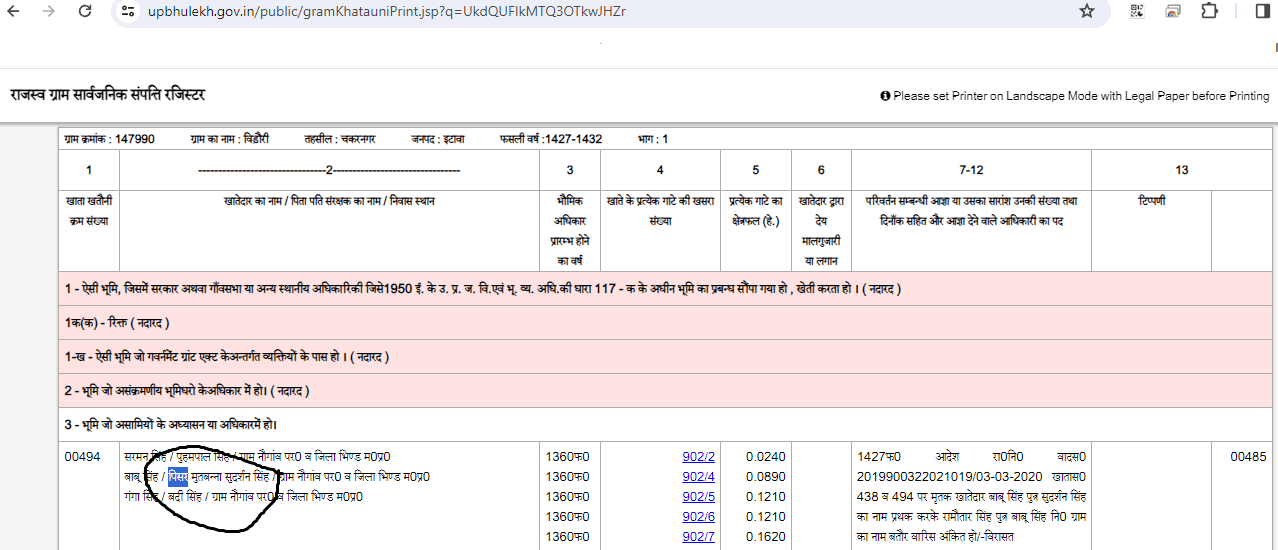The Indian legal and revenue systems are full of Persian and Arabic terms, which a common man does not understand. In this guide, we would discuss one such term ‘pisar-e-mutabanna’.
What is pisar-e-mutabanna?
Pisar-e-mutabanna is a Persian term meaning an adopted son. Written as पिसर-ए-मुतबन्ना in the Dev Nagari script, the word is often used to describe the property rights of an adopted son in India, especially under the Muslim personal law. You will find this term in various land record documents in India.
Look at this Khatauni document sourced from the Uttar Pradesh Bhulekh website, for instance.

Property rights of an adopted son or pisar-e-mutabanna in Hindu law
Under the Hindu succession law, an adopted son is the class-I heir and enjoys all rights that a biological son is entitled to.
Affirming the legal position of an adopted child, the Karnataka High Court in November 2022 ruled that an adopted child has the same right as a biological child, and he/she cannot be discriminated against while being considered for their parents’ job on compassionate grounds. “A son is a son, or a daughter is a daughter, adopted or otherwise, if such a distinction is accepted then there would be no purpose served by adoption,” the Dharwad Bench of the Karnataka High Court said.
However, an adopted child cannot stake claim in his adoptive father’s property in case his father was disqualified from succeeding in any property because of a crime he might have committed.
See also: Who is an heir? What is inheritance?
Adopted child stops being coparcener of birth family
An adopted son stops being a coparcener of his birth family and consequently gives up any right or interest in the family ancestral property, the Telangana High has ruled. In an order dated June 27, 2023, the high court said that if a partition took place before the adoption and the property was allotted to the adopted person, he could carry that property to his new family.
“Only if a partition has taken place before the adoption and property is allotted to his share or self-acquired, obtained by will, inherited from his natural father, or other ancestor or collateral which is not coparcenary property held along with other coparceners and property held by him as sole surviving coparcener, he carries that property with him to the adoptive family with corresponding obligations,” said the HC.
In another order, the Kalaburagi Bench of the Karnataka High Court has said that an adopted son becomes a coparcener in the adopter’s family and loses the right of succession in his biological family properties.
“If the adoptee was the member of the joint family at the time of adoption, his rights in the joint family property extinguish unless, he possessed those properties by way of partition. It was observed that on adoption the adoptee gets transplanted in a family in which he is adopted with the same rights as that of a biological son and as such, transfer of the adopted child severs all his right with the family from which he was taken in adoption. It was categorically held that, he loses right of succession in the genitive family properties,” the HC said in its order dated July 14, 2023.
See also: What is ancestral property? How is it divided?
Property rights of an adopted son in Muslim law
Under the Muslim personal law, adopted sons don’t enjoy the same status as the biological sons of their parents. In the absence of a blood relationship between the adopted child and his/her adoptive parents, the adopted child cannot be the heir of his adopted parents. As a result of this, they can’t claim any share in their parents’ ancestral property. This remains true even if the adoptive parents don’t have biological children. However, the parents are free to give their self-acquired property to the adopted son by way of a gift deed or a will.
| Got any questions or point of view on our article? We would love to hear from you. Write to our Editor-in-Chief Jhumur Ghosh at jhumur.ghosh1@housing.com |







